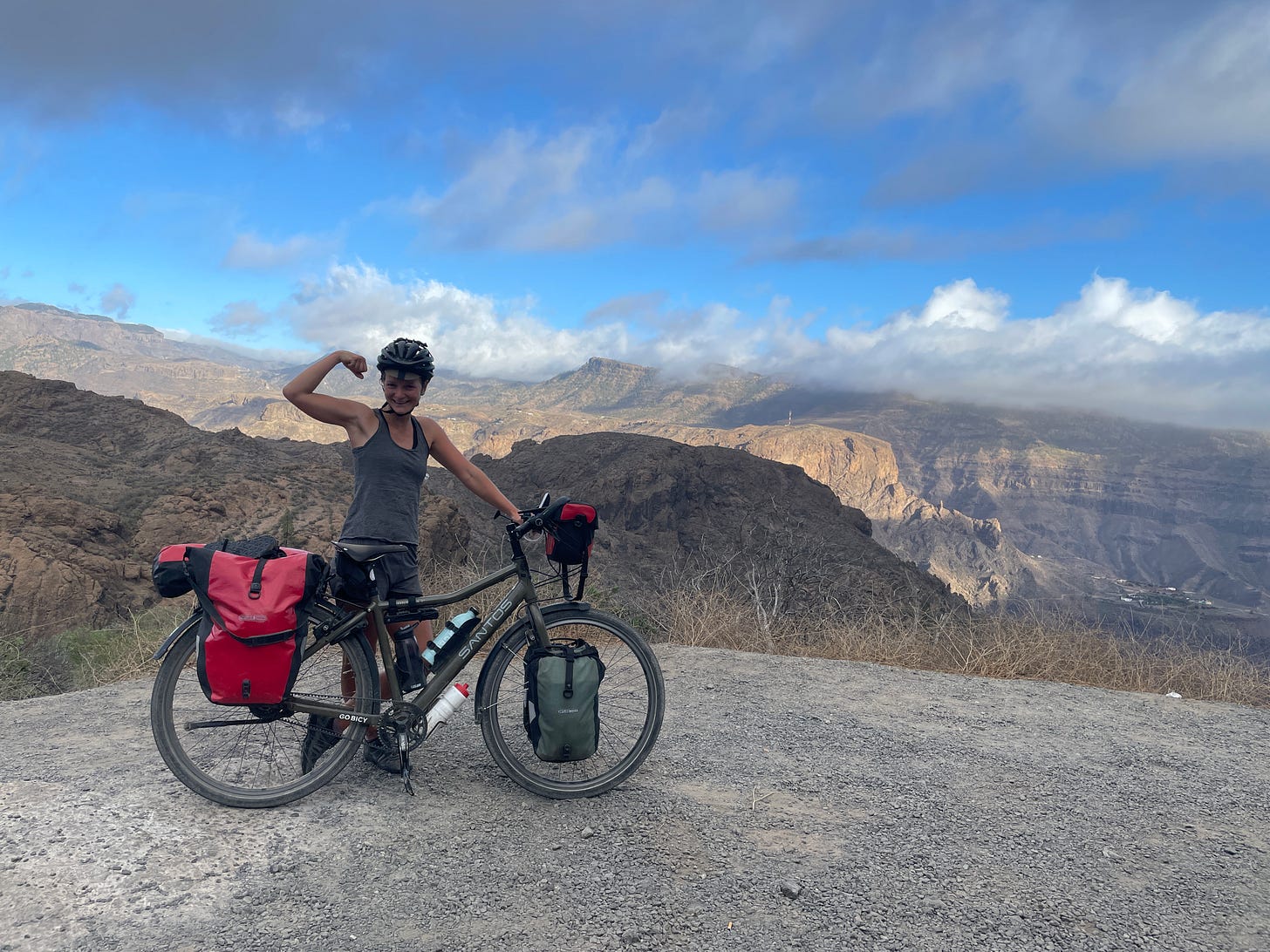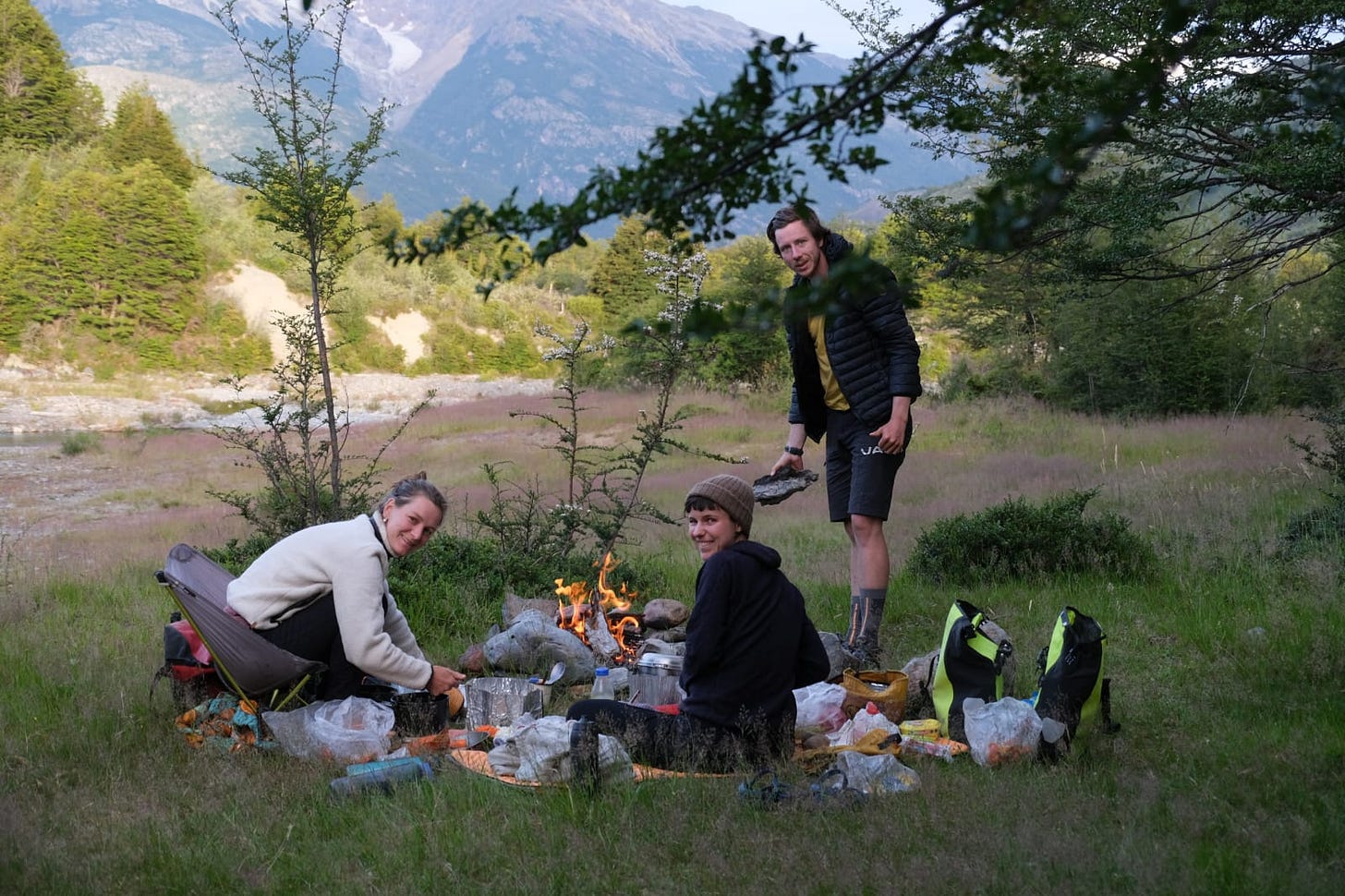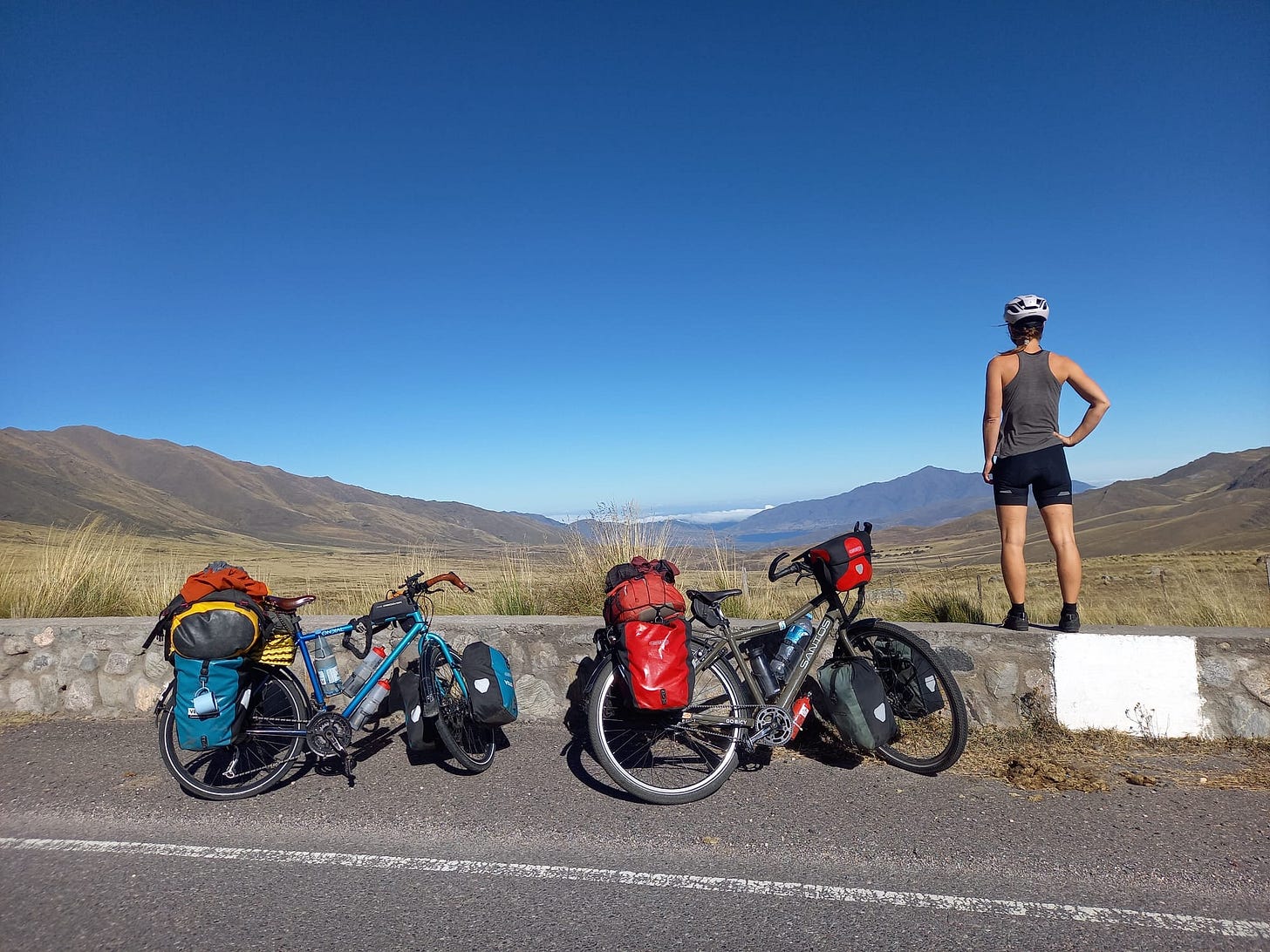Spoke 6: Understanding and loving your cycle
Featuring 10,000km Arriba's sixth guest writer, Maud Jansen
Part of Guest Writers Season 1
Post 6/6
Dealing with your period and hormones on long cycle trips
Hey people out there, it may look like an article for women only, but that's not the case! I promise this blog is interesting for everybody. You may learn something that you have never thought about before because cycle touring whilst experiencing your period is not a topic you can find a lot of information about.
On my 7-month trip from southern Argentina to La Paz in Bolivia this year, I met many fellow women cyclists on the road. This was so inspiring because this wasn't always the case during my previous tours. Seeing other female solo riders out there was fantastic; we need more and more.
With those women I could speak about female hygiene. How do other women deal with things like wild camping and having your period? And how does our hormonal cycle effect a long cycle trip like this? And the practical part, how do you change when there is not a lot of water? It's time to be open and honest about this part of our body we must deal with and how to work with it on a long trip.
Disclaimer: every cyclist is different, so do what feels good for you.
Getting my period in the middle of nowhere
Imagine, riding in a national park in southern Chile in between the volcanoes. Far from villages and with no phone reception at all. I was with three other cyclists, and we wanted to hike to a glacier with a great view of the largest volcano in the area.
In the morning, just before the start, I found out I got my period. Aargh, timing. But hey, I was longing for that hike and it shouldn't be too difficult. So, I set off walking anyway.
The first half was beautiful and I managed well. At the return point we had a great break with amazing views. However, on our way back, there was a cold wind and I couldn't get warm anymore. My body started to feel weak and my friends took my backpack; I was counting the kilometers.
Upon arriving back to our campsite I went straight into my tent and put on more layers. I didn't know what was going on. I felt cold, nauseous, weak and had lots of cramps. It was only 3pm in the afternoon, how could I survive another night here with minus temperatures when feeling like this? I had a little panic. I'd never experienced this before.
After my friends came back they prepared hot water bottles to stuff in my sleeping bag. I was so happy to not be alone at that moment. It was a vocal protest from an exhausted body for which the combination of a week with a lot of physical effort, a heavy cold and a period on top was just too much. It was saying loud and clear: STOP!
I fell asleep and woke up very warm. Hurray, I survived the night! I could eat some porridge and have a hot tea whilst we started preparing for takeoff. But as soon as I started cycling, I felt nauseous and exhausted again. We still had to climb a bit on an offroad path. What a misery. I was so happy with my friend Laura who helped me push my bike. Women power!
After a long day we made it to a warm and comfy house where I could rest some days and let my body recover. This experience taught me again new things about myself. About taking care of my body during my cycle. Would it have been a different experience if I had followed my own pace that day and in the weeks before?
The cycle and how it affected my trip
Every woman has her own cycle. It's different for everyone and of course it also matters if you have some kind of hormonal contraception that is regulating it. Or maybe you had the menopause and then you experience a change from your normal cycle.
In all those situations you will notice that your energy levels are contrasting in the different stages. Let's call them spring (first week), summer (days around the ovulation), autumn (pre-period time) and winter (period itself), like in the book Period Power (a must read if you want to better understand a body with a uterus). It's a very good idea to plan your trip around the information that is specific to you and your body.
Spring and summer are the type of 'hey ho, let's go!' weeks. My energy level is very high, and I can make long days on the road. I don't really plan; I only know that I have a lot of energy and that I have to use it if I feel like it. I enjoy cycling, hiking and social activity, even when combined. I can easily have less sleep and still function well. I'm able to make decisions, I know what I want and where to go.
When autumn is coming closer, I must think ahead. What is the route for the coming weeks? Can I make the cycle days easier? That can be shorter distances, shorter days and/or no huge efforts like cycling crazy mountain passes.
Then, autumn begins. It's the phase some women have PMS and a lot of hormonal fluctuations. I feel like my head is in a cloud, I have less energy and need more sleep. I become a bit more of an introvert and I cannot make any decisions.
Sometimes, like in my story, it comes when it comes and you must deal with the situation. No choice, just take care as well as possible and move on. We are stronger than we think we are. Always listen to your body and do whatever is needed to recover.
The practical part
When winter arrives, a rest day is very welcome. It also helps to have a bit more comfort or simple luxuries from an out times, difficult touring life. For me, that means sleeping at a campsite or hotel and having access to water and a toilet. Oh, and a nice cup of coffee and a cake is always appreciated ;-). These aren't huge indulgences, but they make a big difference.
Arriving in winter means the period is there. You need something like period pads, a menstruation cup (my golden winner), tampons or period panties. Be aware that it is not always easy to find what you need. Tampons are hard to get in tiny villages in remote areas. Pads are easier, but they aren’t the most comfortable in cycle pants. Hurray for the cup, because once you have it you don't need to buy something else.
Whatever you use, you need to change. I like the cup because I only need to change two times a day, which is less than using tampons or pads. If you’re at campsites or a hostel, it's like normal. But how do you deal with this on the road looking for bathrooms? What happens if there are no bathrooms at all? Or even no running water?
Option one is to find some bathrooms. Gas stations, bars, restaurants; there are quite a lot of toilets to find. But with a cup you must rinse it. So, hurray for disabled toilets because they have a tap in the toilet. If this is not available, I take my water bottle with me to the toilet and use the water to rinse my cup. Sorry for all the details; but this is the practical part women want to know.
Being in the wild and the open, like the pampa of Argentina, the situation is different. You have to take extra water with you, I would say one litre a day, for the moments to clean and change. I look for a quiet spot and take my water bottle, toilet paper and (nature friendly) soap with me. I dig a little hole, take my cup and rinse it. I then cover it with sand, wash my hands and voila, that's it (the toilet paper I take with me of course).
The first time it was a bit weird I have to admit. But later I found it more hygienic that changing in an old, dirty toilet in a café next to the road.
So, there's your little insight into cycling with hormones. I could go on about cyclists' intimate hygiene, cycle pants and what creams help your butt survive... but that is for another time.
I wish you all nice and smooth rides with good moods and high energy. Be kind to yourself and enjoy the world out there.
Maud has a social work background and has worked for various NGOs. She is a trip leader of adventure holidays for people with mental disabilities in between her trips.
After a sabbatical of 3 months in 2019 with a ride from Netherlands to Albania she got hooked on cycle travel. She subsequently quit her job in 2020. It was time to retire in her 30s and discover more of the world!
In autumn 2020 she cycled from the Netherlands to Portugal. She spent the winter and lock-downs there and cycled all of the Iberian country over 9 months.
In 2021 she cycled via Switzerland to the south of Italy and then spent four months on the Canary Islands. After escaping lock-downs, exploring all the islands, a crazy amount of climbing, and a little crash, she was exhausted.
She took time to recover, work a bit and enjoy her new love back home for a while. She got itchy feet in autumn 2022 when the days were grey and short, so she booked a ticket to the south of Argentina and started cycling north. She had no end date or destination, just a desire to meet people, traverse landscapes and enjoy a life of adventure.
From La Paz, Bolivia she returned home after 7 months. Time for some work and to see how she still can mingle her travel life with establishing a life the Netherlands at the same time...
Follow her on Instagram @maud_onherway for some incredible photos and videos.
A call for writers
If you’d like to guest write on 10,000km Arriba, you’d be most welcome.
You can write about any bike based experience, whether a short or long trip, a chronic cycling addiction, or simply a moment on two wheels that you deeply cherish.
Let me know in the comments.
The 10,000km Arriba story so far
Chapter 1 | Chapter 2 | Chapter 3 | Chapter 4 | Chapter 5 | Chapter 6 | Chapter 7
Other female guest writers
Back to life, back to reality (AB)
'Here is no final grieving, but an abiding hope. The moving waters renew the earth. It is spring.' A Child of Our Time, Michael Tippet
The stuff we’re made of (ZL)
↑This article has an audio option recorded by the author. Press play to listen or scroll down to read.











Thanks for sharing this! It's not a topic I knew anything about and I learned a lot from this piece.